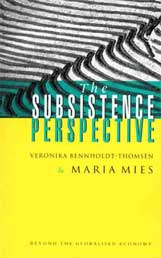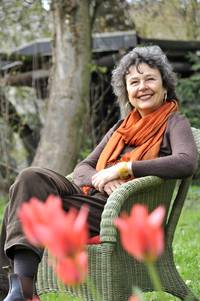Menu

"Money or Life: What makes us really rich"
Now in English! Free download (39 pages pdf) of WLOE's translation of the original German essay by Veronika Bennholdt-Thomsen on our relationship with the money economy -- and alternatives.
Other books by Veronika Bennholdt-Thomsen

The Subsistence Perspective:
Beyond the Globalized Economy
with Maria Mies, 1999
The Economics of Happiness
Local Futures offers a free, shortened version of its award-winning documentary film The Economics of Happiness. This 19-minute abridged version "brings us voices of hope of in a time of crisis." www.localfutures.org.
Money or Life: What makes us really rich

This work by sociologist Veronika Bennholdt-Thomsen is based on years of research, writing, teaching and her own activism.This review appeared in a 2010 German community oriented newspaper from Berlin, written by Jörg Parsiegla (WLOE e.V. translation):
MONEY OR LIFE: What really makes us rich. 39 p. download here
"The somewhat sensational heading Veronika Bennholdt-Thomsen has chosen for her essay, is misleading. This is neither a soft-edged guidebook for the stressed nor a manual for self-fulfilment.
No, the professor at the University of Natural Resources and Life Sciences in Vienna, Austria and director of the extramural Institute for Theory and Practice of Subsistence in Bielefeld, Germany discusses a major issue for the future: What if the conversion of money into goods we need for living no longer works because money has evaporated into thin air? Admittedly, this scenario seems exaggerated at first glance however, considering the current systemic economic crisis – from fiscal packages to Euro rescue parachutes - this question is not entirely off target.
However, Bennholdt-Thomsen’s approach would also work in the absence of the current economic crisis. In eight chapters and just under 100 pages, the author expounds the subsistence theory which describes an existence aimed at generating the essential – while not necessarily drawing comparisons to the Stone Age.
Why is it that the subsistence principle is discredited with large sections of modern society and equated with poverty? Bennholdt-Thomsen derives her answers from the theory of capitalism and presents five reasons why the perception of subsistence is blocked from today’s point of view, such as disregard for nature, colonialist exploitation and fear of scarcity.
She exposes the obligation to economic growth and the dictatorship of money, which allow LIFE only as a byproduct, and replaces them with decommercialisation of heads and hearts – heavy fare for the reader since she implies that more or less (almost?) all of us are accomplices with self-interest in mind. At least it is comforting to know that, while we are the problem, we can also be the solution: “The appeal to individuals and civil society (…), as voiced today from a broad range of movements, to work for an ecological and socially just world, originates from this view from below".
And so the author answers the questions that come up automatically while reading this essay: How can we live today without money? Why should we not shop in a super market? The specific answers – swap meets, freeshops, regional currencies – may seem insufficient at first glance and utopic when considering global dimensions. However, Bennholdt-Thomsen believes these to be the first steps in creating decommercialised zones which will not only introduce new opportunities for participation by the socially disadvantaged, but also the return of virtues such as the overcoming of greed, appreciation of small trade and strengthening of local and regional economic concepts. Thus, she propagates a culture of giving, whereby Homo donans replaces Homo oeconomicus and subsistence replaces growth.
MONEY OR LIFE is published as part of oekom verlag’s new series “thinking outside the box”. In these slim booklets, well-known authors offer their daring ideas as new approaches to alternative thought and ways of life. With this essay, Veronika Bennholdt-Thomsen offers thought provoking impulses encouraging the first steps towards change. Suggestion for the interested reader: bite your way through it, let it settle and start thinking!"

